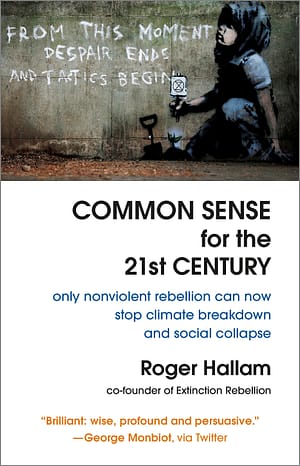What We Need To Achieve

With the climate crisis closing in, we need to consider what we need to do to make permanent, sustainable change for the better. We need a list of specific and realistic goals, and we need to push that list on those in power. The result will not be immediate, but if we follow through, we will set the stage for real change.
The following is an excerpt from Common Sense for the 21st Century by Roger Hallam. It has been adapted for the web.
Stop the world warming

Doing so will require us to largely eliminate human created greenhouse gas emissions of all types within a decade or two and also take actions to cool the earth. The latter is required to reduce the risk of triggering runaway climate feedbacks or tipping points.
Eliminate fossil fuel use and close that industry down
We need to eliminate fossil fuels from the economy, and we need to do so within 20 years, with most of the work done in the next 10 years. That means immediately banning all new investment in fossil fuel exploration and development.
- Close down all coal-fired power stations – the dirtiest within 5 years, and the remainder within 10 years.
- Close down all gas-fired power stations, most in the next 10 years.
- Convert all transport to electricity, with the electricity generated by zero carbon energy sources.
- Manage this process with a massive reduction in energy use even if that means rationing.
This all means we will reduce the income of fossil fuel companies worth trillions of dollars, including all of the world’s oil, coal and gas companies. They had the chance over 30 years to transform and chose not to. Now they must work with a transition process and reinvest in renewables or go out of business. Governments will have to provide education and retraining programs to help people who lose their jobs and address the impact on the communities. The financial implications for the national and local authorities and the pension funds invested in fossil fuels will also need to be addressed.
If global fossil fuel combustion is rapidly eliminated, the earth will experience a surge of warming due to a reduction in the polluting aerosols (which in turn reduce the level of sun- light reaching the earth). To counter this, we will need parallel drastic cuts in short-lived climate pollutants such as methane, black carbon, hydrofluorocarbons, and ground-level ozone.
Drive massive energy efficiency including rationing and demand management
To close down power plants, even with rapid global expansion of renewables, will need a massive global drive for energy efficiency that will probably include energy rationing until we get there. It will, in most cases, be economically beneficial to drive such efficiency.
Restore forests and ecosystems
We need a massive global reforestation program, planting trillions of trees to absorb CO2 as proposed recently in the journal Science.15 This is one of the cheapest ways to absorb carbon from the atmosphere. It will take decades to start to absorb large quantities of CO2, but reforestation will then have a huge impact over the following decades and will help to restore the climate, refreeze the earth’s poles and be enormously beneficial to biodiversity.
Reduce the greenhouse gases in the atmosphere
We face tipping points that could trigger runaway climate change with the system spiralling out of our control and the likelihood of global collapse within a decade or two. We need to cool the planet as fast as possible. This means shifting from just focusing on ‘reducing emissions’ to also ‘reducing warming’ to give us the time for a parallel rapid reduction in CO2 emissions to have its long-term impact. There are a number of ways to slow and then reverse short-term warm-ing. The cheapest, fastest and best understood action would be radical reductions in methane emissions. That means:
• We need to eliminate the use of gas as an energy source in less than 10 years.
• We need to lower consumption of animal products, especially industrially produced animal products.
Featured Video
Recommended Reads
All In the Question: What If We Started Asking Better Questions?
Recent Articles
Why is modern wheat making us sick? That’s the question posed by author Eli Rogosa in Restoring Heritage Grains. Wheat is the most widely grown crop on our planet, yet industrial breeders have transformed this ancient staff of life into a commodity of yield and profit—witness the increase in gluten intolerance and ‘wheat belly’. Modern…
Read MoreAddressing the pressing issues affecting everyday Americans is essential—and one of our nation’s most profound challenges is the devastating impact of mass layoffs. Layoffs upend people’s lives, cause enormous stress, and lead to debilitating personal debt. The societal harm caused by mass layoffs has been known for decades. Yet, we do little to stop them.…
Read MoreWhat does facing the beast mean? In this time of uncertainty, we must practice regular reflection to achieve optimal happiness and health. The metaphor below gives insight into confronting and facing it, regardless of what “the beast” is to you. The following is. an excerpt from Facing the Beast by Naomi Wolf. It has been adapted for the…
Read MoreWe’ve all heard of the phrases “time flies” and “time heals all wounds,” but what really is time, and how does it impact our lives? The concept of time may be even more powerful than we think, especially when it comes to the money we save and spend. The following is an excerpt from The…
Read More“Climate change asks us questions that climate science cannot answer,” — Dougald Hine When it comes to climate change, it seems as if there are always new questions arising: How did we get to this point? How can we stop it? What’s next? Unfortunately, there is no black-and-white, straightforward answer to any of them —…
Read More









